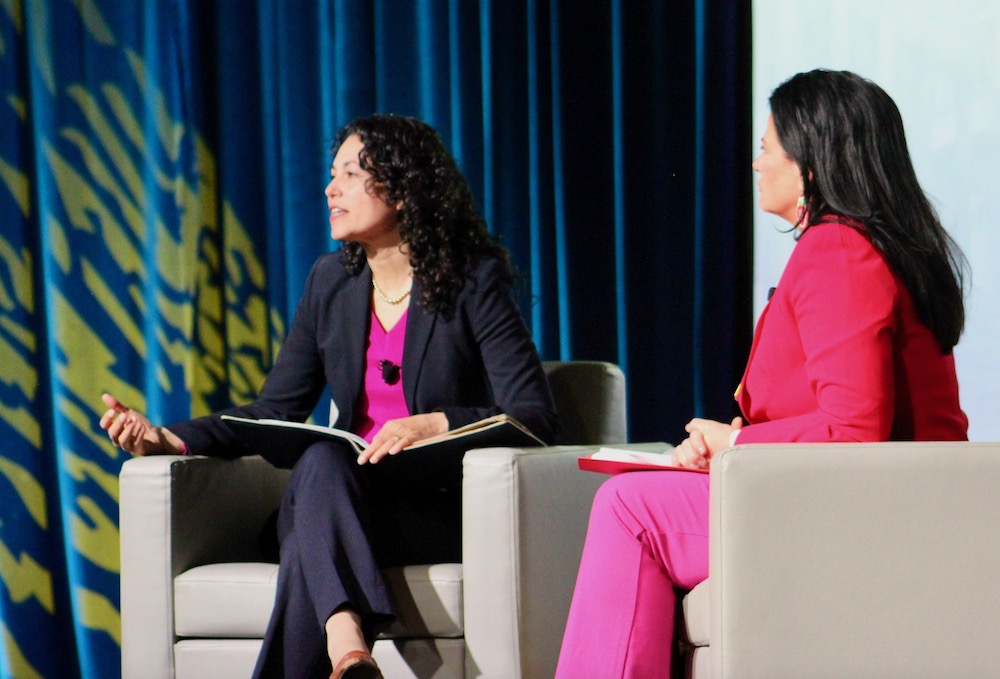
- Details
- By Chez Oxendine
The Department of Agriculture Forest Service will distribute $20 million in grant funding to help tribes access private markets for forest resilience and climate mitigation that have emerged in the wake of climate change.
Federally recognized tribes, Alaska Native Corporations, and Alaska Native villages will be eligible for the resultant competitive grant program.
The grants were announced earlier today by Agriculture Deputy Secretary Xochitl Torres Small during the winter session of the National Congress of American Indians in Washington, D.C.
The new grant initiative, funded by the Inflation Reduction Act, aims to give tribes broader access to emerging markets that will help them address the climate crisis, support Indigenous knowledge and strengthen tribal economies, according to a USDA announcement today.
Proposal submissions for the new grant opportunity are now open through grants.gov, and will be accepted through Aug. 21, 2024. Grants may support activities such as forest management plan development, reforestation, and biodiversity protection.
The new grant builds on existing USDA efforts to bolster co-stewardship relationships between tribes and the Forest Service, according to the announcement. USDA pointed to 120 co-stewardship agreements executed between tribes in 2023 — more than triple the number of relationships it forged in 2022 — as well as other funding allocated to climate mitigation projects.
Climate mitigation projects include a $2 million direct award to the Indian Land Tenure Foundation’s National Indian Carbon Coalition Project, as well as a $13 million agreement with the Denali Commission, a federal effort to support infrastructure and development throughout Alaska. That agreement includes $10 million for grants to support Alaska Native landowners and $3 million for grant application and management support.
Donate today so Native News is free for all readers.
“Tribal practices support resilient forests and land management for the benefit of future generations," Torres Small said.
The goal of the new grant program is to help Natives both join in widespread climate mitigation and preservation efforts while creating a “new line of income,” Torres Small told the audience at NCAI. As examples, she pointed to existing sequestration efforts by the Fond du Lac Band of Lake Superior Chippewa in Minnesota and the Yurok Tribe of Northern California.
Carbon sequestration, in particular, has become an increasingly popular method of turning sustainability into profitability for tribes. In Minnesota, for example, carbon offsets are expected to cover the costs of a 28,000-acre landback purchase by the Bois Forte Band of Chippewa that occurred in 2022.
“There’s a hope that by continuing this work and applying for these funds, you have the opportunity to turn it into a market,” Torres Small said. “Hopefully this investment in the work…creates an opportunity to do that even more and to be able to have a long term sustainable line of income as well.”
Levi Rickert provided additional reporting on this story from the NCAI winter session in Washington, D.C.
More Stories Like This
Trump signs law that revokes some limits on drilling in Alaska’s National Petroleum ReserveSouthern Sierra Miwuk Nation Gets 900-Acres ofLand Back
Chilkat Indian Village Tells New Palmer Mine Owners They Are “Not Welcome” in Chilkat Valley
Tribes, Coastal Group Ask Army Corps to Revoke Permit for Texas Export Terminal
Michigan Tribes Tell Supreme Court: Don’t Bail Out Enbridge
Help us defend tribal sovereignty.
At Native News Online, our mission is rooted in telling the stories that strengthen sovereignty and uplift Indigenous voices — not just at year’s end, but every single day.
Because of your generosity last year, we were able to keep our reporters on the ground in tribal communities, at national gatherings and in the halls of Congress — covering the issues that matter most to Indian Country: sovereignty, culture, education, health and economic opportunity.
That support sustained us through a tough year in 2025. Now, as we look to the year ahead, we need your help right now to ensure warrior journalism remains strong — reporting that defends tribal sovereignty, amplifies Native truth, and holds power accountable.
 The stakes couldn't be higher. Your support keeps Native voices heard, Native stories told and Native sovereignty defended.
The stakes couldn't be higher. Your support keeps Native voices heard, Native stories told and Native sovereignty defended.
Stand with Warrior Journalism today.
Levi Rickert (Potawatomi), Editor & Publisher


